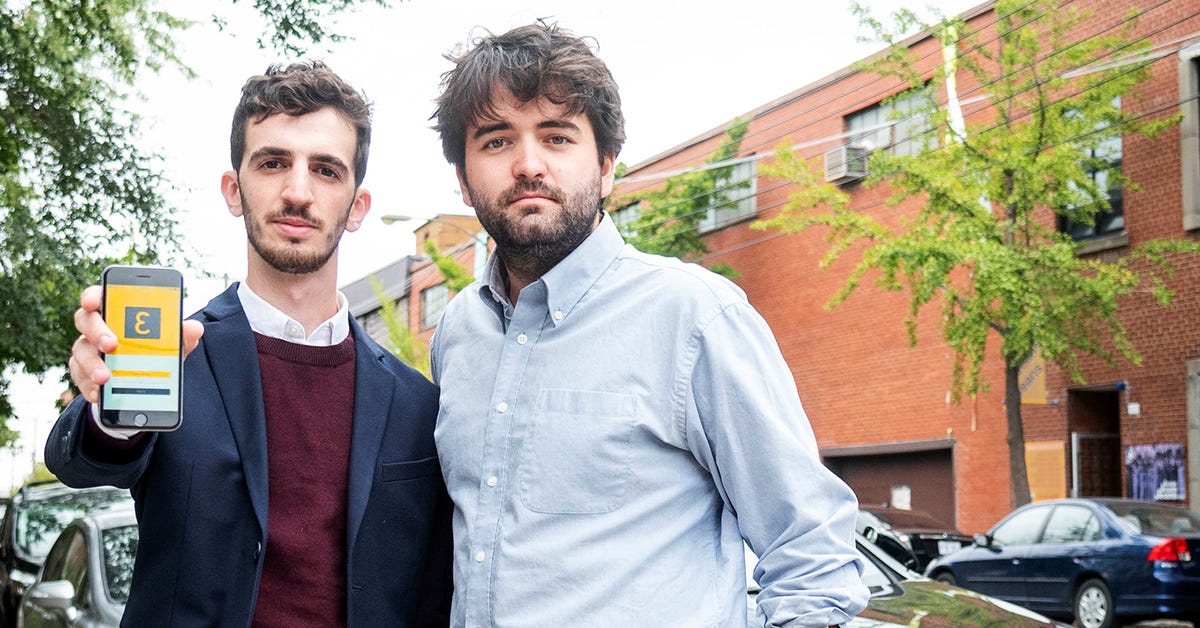译文/Translated:
区块链开发者最经常兜售的一个概念是“去中心化”。Eva背后的团队自然对这个概念也热情满满,但是这款基于EOSIO区块链协议的“拼车应用”还有另外一条指导原则——“本地化”,对Eva来说,“本地化”和“去中心化”几乎是击鼓相当的两个根本原则。

Eva的联合创始人暨首席技术官Raphaël Gaudreault向我们阐述了他是如何关注到本地化的。“2017年底,Uber威胁加拿大魁北克政府,如果规则不放松,Uber将退出该省。”那时候他就和现在Eva的首席优化官、当年还在校园中学习软件工程和政治科学的Dardan Isufi一起思考这个问题。他们最后的结论是“传统的拼车公司以增加城市开支和忽略本地规则为代价敛财。”
在他们看来,这种所谓“共享经济”的这个分支存在的问题就是榨取了本地市场的财富。“相比传统的士,这些公司榨取了约四分之一的市场份额,但是这些钱最后用于投资在其它国家的资本市场。他们在做的就是榨干本地经济,导致地方财富外流。”
满怀理想主义,魁北克本地人Gaudreault和阿尔巴尼亚来的Isufi很快就召集了来自世界各地的技术天才成立了研发小组,这其中包括来自美国的Max Gravitt和来自阿尔及利亚的Merouane Benthameur,试图通过破坏先前破坏这个领域的问题重新解决这些问题。Eva的设定是它会在司机和乘客之间构建一个没有中间人的新型关系,而它就是中间的合作网。正如Eva官网所言,“这个项目的核心是其去中心化网络,它采用了区块链技术来实现全球范围内的城市的移动性,但同时也重新分配本地产生的利润。”
在Eva的模型中,每一次交易的85%是给司机的,剩下的均分给这个合作关系的其它成员:一个生态系统的“金库“以及负责维护该网络的基金。区块链可以自动实现这些分配,根据Eva的白皮书所言,它能”进一步整合不同支付方式同时维护一个匿名、稳定和透明的技术合约。“
“Eva部署了一个基于EOS区块链的固定合约从而为城市的移动性提供了一个公开账本,而其成员的信息都会保持匿名。”Gaudreault说。他马上支出,传统的拼车平台收集到的信息也因为信息泄漏问题而声名狼藉。
至于为什么要选择EOSIO技术,他说这个平台的“规模化”和“可持续性”是两个决定性因素。“EOSIO最突出的特点是它给开发者带来的便捷:C++和java的智能合约,可让用户免费使用的内置资源分配机制、量化交易总量的行业水平。
当Eva的智能合约全部完成之后,九月份第一个Eva合作平台将在蒙特利尔开始工作,第二个正在多伦多办理注册手续。这个应用现在也在伦敦举办的Blockchain Live盛会中的Block. One“村庄“被展示出,Reddit论坛上人们对它的兴趣满满,这个团队也希望在不久的将来他们可以在比如阿尔及尔、普利什蒂娜、休斯顿、纽约等各个地方上线。我们可能就此开创了共享经济的新篇章。
更多关于Eva应用的信息可登陆 http://eva.coop
关注我们的EOSIO DAPP热点系列,我们会介绍在我们平台上建立的一些非常优秀的项目。如果您想和我们分享您的项目,请发邮件到spotlight@block.one.
–开发者关系团队、标题:
原文/Original:
Co-operative model could mark a new blockchain-based iteration of the sharing economy
One of the phrases most commonly touted by blockchain developers is “decentralization.” The team behind Eva, “a co-operative ride-sharing application” built on the EOSIO blockchain protocol, are certainly enthusiastic about that concept. But there’s another guiding principle that seems just as fundamental to Eva and that is “localization.”

Raphaël Gaudreault, Eva’s co-founder and Chief Technical Officer, explains how localization came to take center stage. “In late 2017, Uber threatened the government of Quebec, Canada, with leaving the province if its rules were not relaxed,” he says. Along with Dardan Isufi, a fellow student of Software Engineering and Political Science who is now Eva’s Chief Optimization Officer, he began pondering the issue. They came to the conclusion that “traditional ride-sharing companies aggregate the economy at cities’ expense and disregard local regulations.”
The problem as they saw it with this segment of the so-called sharing economy was that wealth was being extracted from local markets. “These companies capture around a quarter of market share versus standard taxis, but the money is invested in capitalization in other countries. They simply aggregate the economy and delocalize it.”
Buoyed by a sense of idealism, Gaudreault, who is Quebecois, and Isufi, whose roots are in Albania, quickly assembled a multinational team of development talent — including Max Gravitt, from the US, and Merouane Benthameur, from Algeria — to find innovative solutions that redressed these flaws in ways that might, so to speak, disrupt the sector’s earlier disruptors.
Eva is intended to work as a network of cooperatives based around a new relationship between driver and passenger members that removes the middleman. As the Eva website states: “The core of the project is its decentralized network, which uses blockchain technology in order to organize urban mobility on a global scale while ensuring a redistribution of the profits generated at the local scale.”
In the Eva model, 85% of each transaction goes to the driver, with the remainder being split between members of the co-operative, an ecosystem “treasury” and a foundation responsible for maintaining the network. Blockchain automates these allocations, and, according to Eva’s white paper, “improves the ability to integrate different modes of payment while ensuring an anonymous, immutable, and transparent technical protocol.”
“Eva deploys an immutable contract based on the EOS blockchain to offer an open ledger for mobility that keeps members’ data anonymous,” adds Gaudreault. By contrast, he is quick to point out, data harvested by traditional ride-sharing platforms has been notoriously leaky.
As for the choice of EOSIO, he cites the platform’s “scalability” and “sustainability” as deciding factors. “EOSIO’s greatest features include its ease of use for developers, C++ and javascript smart contracts, built-in incentives for resource allocation so users do not have to pay to use the system, and its ability to scale to current industrial levels of transaction throughput.”
With the Eva smart contract finalized, a first Eva co-operative began operations in Montreal, in September, and a second is undergoing local registration in Toronto. The app was among those featured in the Block.one Village at the recent Blockchain Live event in London, Reddit forums have been ablaze with interest, and the team are hopeful of further launches in locations as diverse as Algiers, Pristina, Houston and New York in the near future. A new iteration of the sharing economy may well be upon us.
More information on the Eva app available on http://eva.coop
Stay tuned to our EOSIO DAPP Spotlight series where we’ll highlight some of the truly exceptional projects being built on our platform. If you have a project you’d like to share with us, please email spotlight@block.one.
-Developer Relations team
原文链接/Original URL: